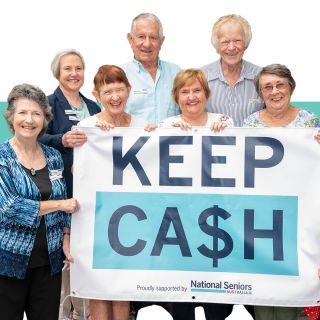White hair syndrome – when you’re the last customer served
A new NSA research report reveals your experiences of ageist treatment in shops, cafes, and bars.

It is a generally accepted fact that when we head out on the town to spend on goods or services, we want to have a fun time and be treated with respect.
Whether we are buying a coffee or a new fridge, none of us want to face patronising attitudes and backs turned against us.
Yet that has been the experience of many older Australians as customers in retail and hospitality venues.
National Seniors Australia’s latest research report, Experiences of Ageism in Retail and Hospitality, showcases written comments by 130+ Australians aged 50 or older about being ignored or poorly treated as customers in shops, bars, and cafes.
The comments were written in response to a question in the 2024 National Seniors Social Survey, in which older Australians were asked whether they had experienced exclusion or discrimination based on their age.
The 1000+ people who said ‘yes’ described many and varied forms of discrimination and exclusion, which we fully reviewed in our 2025 report on the question, Elements of Ageism 4: Experiences of Exclusion and Discrimination.
But people’s experiences in retail and hospitality settings stood out as worthy of special attention.
This is an under-appreciated form of ageist exclusion that needs to be addressed.
We therefore created this targeted report so that people in the retail and hospitality industries can read about the problem in older Australians’ own words.
The consequences of ignoring an older customer or serving them last may seem small to the person doing it. Being left behind happens to us all once in a while, as upsetting or infuriating as it may be.
But when it happens repeatedly, it is debilitating to the person on the receiving end.
The report reproduces all 130+ comments we received on this topic, to help readers get a sense of its prevalence and what it is like to experience the same thing over and over.
Feeling invisible is a common experience. Comments included:
“Sometimes in stores, shop attendants ignore you as if you are not there.”
“I feel like I’m invisible at times, especially in restaurants. I often joke that it’s a good time to rob a bank as no-one sees me!”
“In cafes and restaurants have had the experience of being overlooked or forgotten about. I tell my children it is my new superpower, invisibility.”
When customers are queuing, older people are often served last:
“Sometimes when there are younger ones being served ahead, even when I have been waiting longer.”
“Often when shopping/lining up, you are passed over for a younger customer.”
“I call it the ‘white hair syndrome’. Often the older person is left waiting while others are served.”
Some commenters told us that if they were out shopping with a younger person, customer service staff would often speak to them instead:
“Salespeople have addressed my daughter rather than me, despite the fact that I am the purchaser.”
“I have the double-whammy of my assumed older age and being in a wheelchair, so often in a restaurant, cafe, or other retail environment, the assistant will refer/speak to my companion and totally disregard me, often not even looking at me.”
At times the service is actively bad, beyond ignoring older customers:
“I have been treated as if I was an old nuisance by some workers in the deli section of a shop.”
“Often get treated by young service providers with disdain. Being almost shouted at when I ask someone to repeat what they said.”
To read all the comments people made, download the report here.
When this kind of exclusion happens more to older people than younger people, it is clearly ageism – a pattern of discriminatory behaviour based on age. It is illegal. Treating someone differently because of their age contravenes the Age Discrimination Act 2004, whether in customer service or anywhere else.
If a shop or food outlet discriminates against you because of your age, let them know through their customer review channels, including social media. Even send a copy or link to this report if possible! Sometimes people are unaware their attitudes or actions are ageist until it is pointed out to them.
By the same token, if you feel that a business has done a great job of being inclusive towards older people, give them positive feedback so they keep doing it.
It’s to businesses’ advantage to improve their game. Ageist attitudes are not just bad for customers, they’re also bad for business.
People who experience ageist service often do not come back and do not spend their money at that business again.
As one person wrote:
“Often excluded from service in shops - if this happens, I don’t use the service again - their loss as I have the means to employ them.”
Read the full report here.
*The discount applies to the total National Seniors travel insurance premium and is for National Seniors Australia members only. Discounts do not apply to the rate of GST and stamp duty or any changes you make to the policy. nib has the discretion to withdraw or amend this discount offer at any time. This discount cannot be used in conjunction with any other promotional offer or discount
National Seniors Australia Ltd ABN 89 050 523 003, AR 282736 is an authorised representative of nib Travel Services (Australia) Pty Ltd (nib), ABN 81 115 932 173, AFSL 308461 and act as nib's agent and not as your agent. This is general advice only. Before you buy, you should consider your needs, the Product Disclosure Statement (PDS), Financial Services Guide (FSG) and Target Market Determination (TMD) available from us. This insurance is underwritten by Pacific International Insurance Pty Ltd, ABN 83 169 311 193.

















